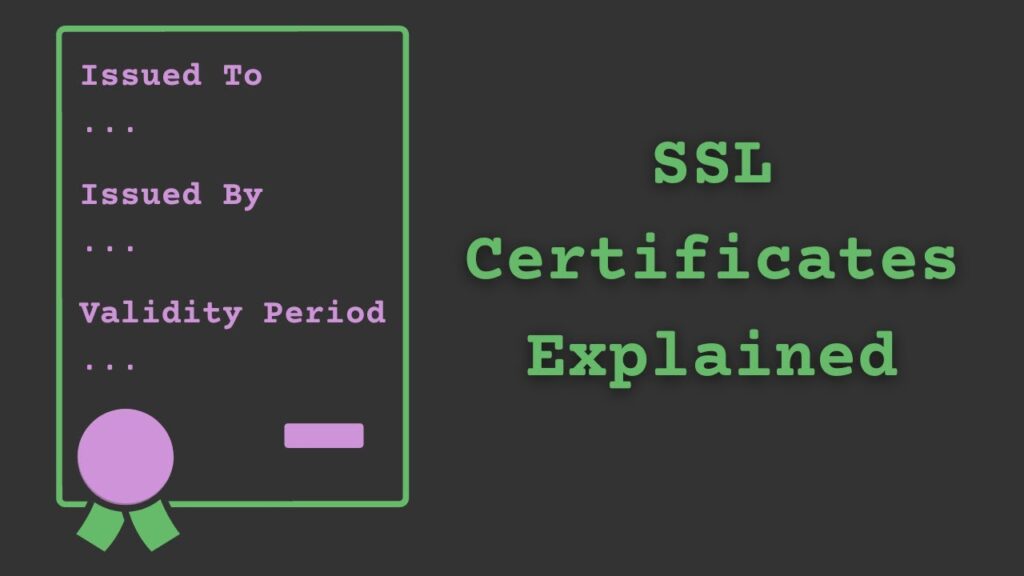SSL Certificates: What You Need to Know
In today’s digital age, online security is paramount. Whether you’re running an e-commerce website, collecting sensitive customer information, or simply want to ensure a secure browsing experience for your visitors, an SSL certificate plays a crucial role. But what exactly is an SSL certificate, and why is it essential for your website? In this blog post, we’ll dive into the world of SSL certificates, unraveling their purpose, benefits, and how they work to safeguard your online presence.
What is an SSL Certificate?
SSL stands for Secure Sockets Layer, and an SSL certificate is a digital certificate that establishes a secure encrypted connection between a web server and a web browser. In simpler terms, it ensures that the data transmitted between a website and its visitors remains encrypted and protected from potential eavesdropping or tampering.
How Does an SSL Certificate Work?
When a user visits a website with an SSL certificate, their web browser initiates a secure connection with the website’s server.
- Encryption: The SSL certificate encrypts the data transmitted between the browser and the server, ensuring that it cannot be easily intercepted or deciphered by unauthorized parties.
- Authentication: The SSL certificate also serves as a means of authentication. It verifies the identity of the website, ensuring that visitors are indeed connecting to the intended and legitimate website.
- Data Integrity: The SSL certificate guarantees the integrity of the data exchanged. It ensures that the data remains intact and unaltered during transmission, protecting against data manipulation or corruption.
- Trust Indication: Once the secure connection is established, the web browser displays visual cues to indicate the presence of SSL encryption. This includes a padlock icon in the browser’s address bar, a “https://” prefix in the website URL, or a green address bar, depending on the level of the SSL certificate.
Why is an SSL Certificate Important?
Implementing an SSL certificate offers several key benefits for website owners and their visitors:
- Data Security: The primary purpose of an SSL certificate is to protect sensitive information, such as login credentials, credit card details, or personal data, from falling into the wrong hands.
- Trust and Credibility: SSL certificates enhance the trustworthiness and credibility of your website. The visual indicators of a secure connection reassure visitors that their information is secure, improving their confidence in your brand.
- SEO Benefits: Search engines like Google prioritize secure websites in search results. Having an SSL certificate can contribute to better search engine rankings, potentially boosting your website’s visibility and organic traffic.
- Compliance with Data Protection Regulations: With the rise of data protection regulations like the General Data Protection Regulation (GDPR), having an SSL certificate is often necessary to comply with the legal requirements of handling and transmitting personal data.
- Protection Against Phishing Attacks: SSL certificates help protect against phishing attacks, where malicious actors attempt to deceive users by impersonating legitimate websites. The presence of an SSL certificate assures visitors that they are interacting with a genuine and trustworthy website.
Types of SSL Certificates
There are various types of SSL certificates available, catering to different levels of security and needs:
- Domain Validated (DV) SSL Certificates: These certificates offer basic encryption and authentication, verifying the ownership of the domain. DV SSL certificates are typically issued quickly and are suitable for personal websites or blogs.
- Organization Validated (OV) SSL Certificates: OV SSL certificates provide a higher level of authentication by validating the domain ownership and conducting additional checks on the organization. They are ideal for small businesses and e-commerce websites.
- Extended Validation (EV) SSL Certificates: EV SSL certificates offer the highest level of validation and trust. They involve a thorough vetting process, including verifying the legal existence and physical location of the organization. Websites with EV SSL certificates display a green address bar, signifying the highest level of security.
- Wildcard SSL Certificates: Wildcard SSL certificates cover multiple subdomains under a single domain. This makes them suitable for websites with multiple subdomains or complex infrastructures.
- Multi-Domain SSL Certificates: Multi-Domain SSL certificates, also known as Subject Alternative Name (SAN) certificates, allow you to secure multiple domains or subdomains with a single certificate. They are ideal for businesses with multiple online properties.
How to Obtain an SSL Certificate
To obtain an SSL certificate, follow these general steps:
- Choose a Certificate Authority (CA): Select a reputable Certificate Authority to purchase your SSL certificate. Some popular CAs include Comodo, DigiCert, Symantec, and Let’s Encrypt (which offers free SSL certificates).
- Generate a Certificate Signing Request (CSR): Generate a CSR from your web server, providing the necessary information about your domain and organization.
- Submit CSR and Validation Documents: Submit the CSR and any required validation documents to the CA for verification. The validation process may involve confirming domain ownership and organization details.
- Install the SSL Certificate: Once the CA validates your request, they will issue the SSL certificate. Follow the instructions provided by the CA to install the certificate on your web server.
- Test and Verify: After installation, test your SSL certificate to ensure it is working correctly. Verify that your website is loading over HTTPS and that the SSL encryption is functioning properly.
Conclusion
In today’s digital landscape, an SSL certificate is a necessity rather than a luxury. It provides essential security, data protection, and trust for your website and its visitors. By encrypting data, authenticating your website, and displaying visual trust indicators, an SSL certificate safeguards sensitive information, enhances credibility, and ensures compliance with security standards. Invest in an SSL certificate to establish a secure online presence and build trust with your audience.


